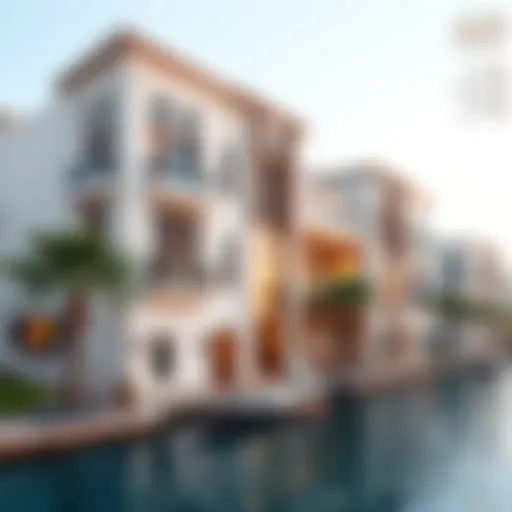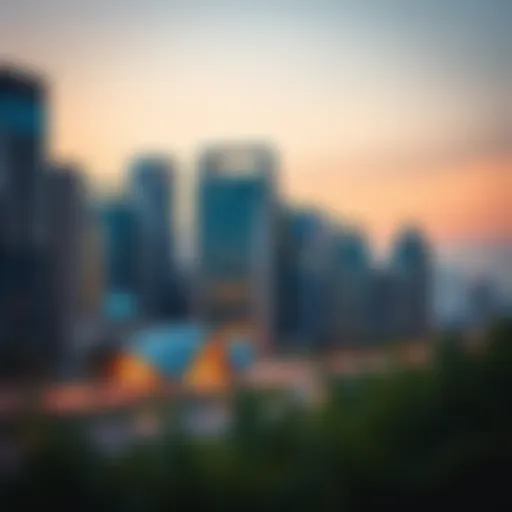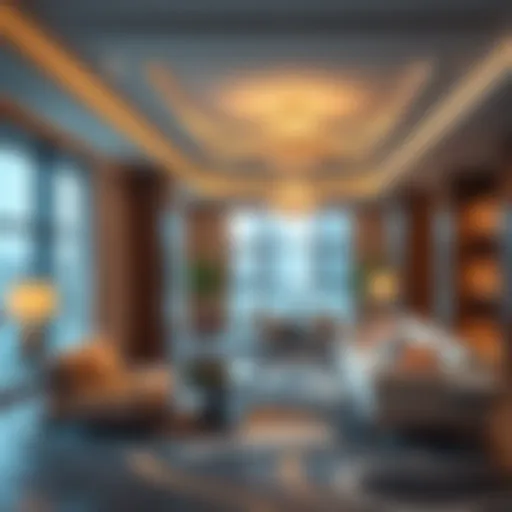Dubai's Rise as a Global City: A Comprehensive Exploration
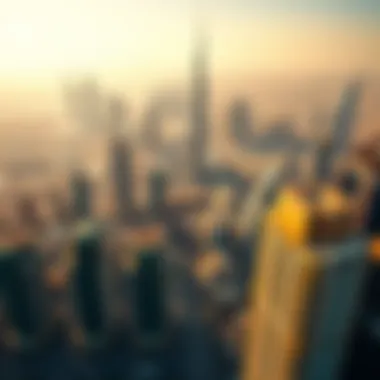

Intro
Dubai, a city that has rapidly transformed itself from a modest desert outpost into a major global hub, is a stunning example of what vision and strategic planning can achieve. In just a few decades, it has become synonymous with luxury, modernity, and innovation. The city serves as an essential gateway for business across the Middle East, North Africa, and even South Asia. Investors, developers, and homeowners are keenly interested in its evolving landscape. As we delve deeper into what makes Dubai stand out as an international city, the focus will be on its thriving real estate market, cultural richness, and economic strategies that contribute to its growing global significance.
Market Insights
Current Property Trends
The real estate market in Dubai reflects the city's dynamic spirit and its attraction for both domestic and international buyers. Recent trends identify a steady increase in demand for luxury properties, particularly in areas like Downtown Dubai and Palm Jumeirah. Furthermore, there has been a noticeable shift toward more affordable housing options, leading developers to create mixed-use projects that cater to various socio-economic classes. Many buyers, both local and expat, are particularly attracted to properties that offer a blend of both high-quality living and convenient access to amenities.
- Luxury properties continue to be in high demand.
- Affordable housing options are gaining traction.
- Mixed-use developments are becoming popular.
- Sustainable living is more than just a trend; it’s here to stay.
Among the various segments, the rental market has also shown resilience post-COVID, with short-term rentals witnessing a resurgence, especially due to events and tourism activity in the city. With Expo 2020 (held in 2021) drawing significant international attention, short-term rental properties became highly sought after.
Pricing Analysis
The prices in Dubai's property sector can be a bit of a mixed bag, but as a whole, they have seen a gradual recovery. After a period of stagnation, the average cost of residential properties has begun to climb again, albeit at a slower pace than many would expect.
- Average property prices have seen a 5% increase in the last year.
- Affordable housing options see prices starting from AED 800,000.
- High-end properties in prime locations can range from AED 4 million to AED 40 million.
To fully grasp these numbers, one should pay attention to various neighborhood statistics, as certain areas experience sharper price fluctuations than others. For instance, locations like Dubai Marina tend to have a higher price per square foot compared to more suburban settings.
"Dubai’s property market is unique; it combines international standards with local characteristics, creating a one-of-a-kind investment opportunity for those willing to dive into it."
The growth trajectory is not unsteady; it requires careful observation and understanding of global economic indicators. This evolving market creates startling opportunities amidst its ever-challenging complexities. For investors, this can mean the difference between a wisely navigated situation and a pitfall.
Investment Strategies
Breaking into Dubai’s property market demands a sound strategy, especially for first-time investors looking to capitalize on this vibrant city.
Tips for First-Time Investors
- Research, Research, Research: Understand the neighborhoods, rental yields, and the type of tenants you wish to attract.
- Leverage Expert Opinions: Consulting real estate agents who know the local market well can save you a lot of headaches later.
- Consider Financing Options: Various banks offer mortgage loans to expats, but terms may vary greatly.
- Be Patient: The real estate market can have its ups and downs; don’t rush your decisions.
Long-Term vs. Short-Term Investments
Successfully investing in Dubai’s real estate requires weighing long-term versus short-term benefits:
- Long-Term Investments
- Short-Term Investments
- Typically lead to stable cash flow through rentals
- Capital appreciation is usually more predictable
- Potential for higher immediate returns during events or peak tourist seasons
- Requires active management and a good understanding of market fluctuations
This duality presents opportunities for a variety of investment strategies and preferences, allowing each investor to tailor their approach according to their risk appetite and market intelligence.
By clearly understanding current market insights and deliberate investment strategies, one can navigate the intriguing yet complex waters of Dubai’s property market. Whether you’re a local veteran or a newcomer, knowledge and insight define the trajectory of success in this international city.
Foreword to Dubai as an International City
Dubai has transformed remarkably over the past few decades, emerging from a modest trading post to a global hub that captures attention from all corners of the world. This section will explore significant factors that contribute to its status as an international city. Understanding these elements is pivotal for investors, expatriates, and anyone interested in the dynamics of a city that blends innovation with tradition, and audacity with opportunity.
The primary thrust of this exploration is to dissect the multi-faceted nature of Dubai. Its strategic geographical location, situated at the crossroads of Europe, Asia, and Africa, plays a crucial role in its success. This geographical advantage allows for seamless trade routes, making Dubai a central point for commerce and logistics. Furthermore, the city boasts a tax-friendly environment, which has been a beacon for businesses and expatriates alike.
Benefits of Understanding Dubai as an International City
Diving deeper into Dubai's multifaceted attributes offers various benefits:
- Economic Insights: With flourishing sectors such as tourism, real estate, and finance, understanding the local economic climate can lead to prosperous investment opportunities.
- Cultural Awareness: Recognizing the diverse cultural tapestry enhances social integration for newcomers while providing businesses a wider market perspective.
- Networking: Realizing Dubai's role on the world stage facilitates valuable networking opportunities that can bolster careers and enterprises.
Moreover, there are critical considerations to ponder. The rapid growth of Dubai presents unique challenges involving sustainability, infrastructure, and cultural integration that are essential to navigate for long-term success. Understanding these dynamics will serve investors and residents alike, guiding them in making informed decisions in an ever-evolving marketplace.
Understanding the Concept of an International City
The notion of an "international city" encapsulates a unique blend of attributes that set a metropolitan area apart. In simple terms, it signifies a locality that has a profound influence on global affairs, economics, and culture. What makes Dubai particularly fascinating is its ability to nurture this identity within just a few years.
An international city is typically characterized by several key attributes:
- Global Connectivity: A web of international flights and trade routes.
- Cultural Melting Pot: A population that encompasses diverse backgrounds and traditions.
- Economic Viability: Robust job market and investment frameworks that attract foreign capital.
Dubai fits snugly into this framework, offering a combination of cutting-edge infrastructure, luxury retail, grand entertainment, and world-class events, all contributing to its allure. The city has developed through strategic initiatives, encouraging businesses to move operations here while ensuring that expatriates feel welcome and at home.
What's more, Dubai has ingrained itself within the fabric of international diplomacy and trade, regularly hosting events that draw world leaders and industry giants, showcasing its capability as a meeting place for ideas and innovations.
"Dubai has captured imaginations, proving that urban landscapes can be as dynamic as the people who inhabit them."
Dubai's Emergence in the Global Arena
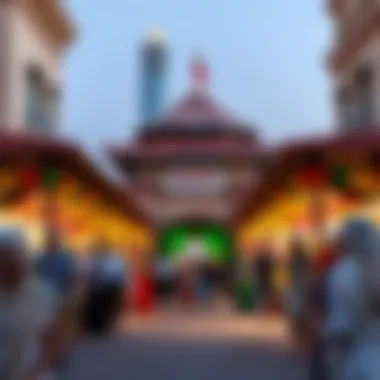

Dubai's rise in the global arena can be traced back to its strategic policies and visionary leadership. A critical milestone was the establishment of the Jebel Ali Free Zone in 1985, which created a haven for international businesses, granting investors remarkable incentives. This moment catalyzed the growth and diversification of Dubai's economy.
Building on this success, projects such as the Burj Khalifa and the Palm Jumeirah have become icons of Dubai's ambition. Each of these developments serves as a testament to the capability and vision of the Emirati people. The creation of free trade zones has also invigorated sectors beyond oil, fostering a strong environment for tourism, technology, and healthcare.
Furthermore, Dubai hosts globally renowned events, such as the World Expo, which brings together nations, innovating collaboration and foster economic endeavor. This approach does not only illustrate Dubai's expanding influence but also solidifies its international credibility.
In summary, understanding Dubai's emergence isn't merely about its real estate achievements but recognizing the intertwining of history, cultural richness, and proactive governance that has positioned it firmly at the center of global affairs.
Historical Context of Dubai's Development
The evolution of Dubai into a global hub is steeped in a rich historical tapestry that chronicles its journey from a humble trading post to a sprawling metropolis. Understanding this context is crucial for investors and stakeholders keen on navigating the city's current landscape. By examining the roots of Dubai's development, we glean insights into its rapid transformation and the forces that shaped it, enriching our grasp of its present dynamics.
From Trading Post to Metropolis
Dubai's ascendance can be traced back to its strategic geographical location along trade routes connecting Europe, Asia, and Africa. Originally serving as a modest fishing village, its significance burgeoned in the mid-19th century when it emerged as a vital point for pearl diving and trade. The establishment of a customs duty in 1901 marked a pivotal moment, giving traders an incentive to pass through its ports. This shift attracted merchants from surrounding regions and laid the groundwork for economic development.
As the 20th century dawned, Dubai remained a pearl diving town. However, the discovery of oil in 1966 was the game changer. The wealth generated from oil exports provided the necessary resources to invest in infrastructure and urban development. Major projects were initiated, including schools, hospitals, and, importantly, a modern road network that connected various parts of the city.
Dubai's leadership, recognizing the finite nature of oil, embarked on a vision to diversify its economy. This foresight set the foundation for everything from tourism to real estate, establishing the diversified economy that we see today. Consequently, the once quiet trading hub transformed into a bustling metropolis adorned with towering skyscrapers and vibrant cultural offerings.
Key Milestones in Dubai's Growth
Several milestones have been instrumental in shaping Dubai into the international city it is now. The following points encapsulate the notable turning points:
- 1971: Formation of the United Arab Emirates (UAE) - This union provided Dubai with a larger platform to develop economically and politically alongside other emirates.
- 1990s: Emergence of free zones - The creation of trade and financial free zones attracted foreign investment and businesses, enabling exponential growth in the economy.
- 2000s: Launch of iconic projects such as the Burj Khalifa and Palm Jumeirah showcased Dubai's ambition and capability to undertake large-scale developments.
- 2010s: Enhanced focus on tourism and events, with initiatives such as the Dubai Shopping Festival and World Expo 2020 (postponed to 2021 due to the pandemic), bringing global attention to the city.
Each of these milestones not only reflects Dubai's adaptive nature but also illustrates the strategic thinking of its leaders. They aimed to push the envelope and reimagine the city’s identity on the world stage, which has undoubtedly paid off.
In essence, the historical context of Dubai's development provides a deep understanding of its current standing as a global city. The path from a simple trading post to a vibrant urban landscape holds valuable lessons for investors, homeowners, and professionals. By recognizing the past, stakeholders can navigate the present and anticipate future opportunities more effectively.
Real Estate Dynamics in Dubai
The real estate sector is a defining aspect of Dubai's transformation into a global hub. It embodies not just the physical structures rising against the skyline but also reflects the city's dynamic economic pulse and its ambition to foster a diverse expat community. With various elements influencing market behavior, understanding these dynamics becomes essential for any investor, homeowner, or real estate professional keen on tapping into Dubai's market.
Market Trends and Insights
In recent years, the Dubai real estate market has experienced notable fluctuations. As cities evolve, staying abreast of trends becomes increasingly vital.
- Price Movements: Property prices have seen varying trajectories. Areas like Dubai Marina and Downtown Dubai have become premium spots, where demand often outstrips supply. Short-term rental markets also offer lucrative options due to tourist inflows.
- Technological Integration: The rise of proptech has made property transactions faster and more transparent. Platforms like Property Finder and Dubizzle offer insights that empower buyers and sellers.
- Sustainability Focus: Developers are increasingly drawing attention to eco-friendly constructions. Projects like The Sustainable City highlight the shift towards greener living, responding to global calls for sustainability.
The importance of understanding market trends is paramount for making informed investment decisions.
Investment Opportunities and Challenges
Investing in Dubai's real estate can be rewarding but is not without its hurdles.
- Opportunities:
- Challenges:
- Luxury Apartments: The high-end market is booming, particularly in iconic developments like Palm Jumeirah and Burj Khalifa.
- Off-Plan Investments: These projects often come at a lower entry price, allowing investors to capitalize on future appreciation.
- Regulatory Landscape: Navigating local regulations can be daunting. Understanding laws related to foreign ownership is crucial.
- Market Saturation: Certain sectors may become oversaturated, leading to price drops. Investors must maintain flexibility to adapt to market changes.
Understanding these opportunities and challenges gives investors a leg up, allowing for strategies that leverage knowledge in decision-making.
Residential vs. Commercial Markets
The distinction between residential and commercial real estate in Dubai is significant, with each market catering to different needs.
- Residential Market:
Residential properties, including villas and apartments, typically attract expatriates. Areas like Arabian Ranches and Jumeirah Beach Residence offer families a mix of lifestyle offerings and amenities. - Commercial Market:
The commercial sector focuses on offices, retail spaces, and mixed-use developments. Spaces in Business Bay or the Dubai International Financial Centre cater to corporate tenants and are in high demand.
In assessing whether to invest in residential or commercial property, potential buyers should consider not only personal goals but also how economic trends and market dynamics shape each landscape.
With a comprehensive understanding of real estate dynamics, potential investors and stakeholders can navigate Dubai's promising yet complex landscape effectively, tailoring their approaches to fit market evolution.
Cultural Considerations and Expatriate Life
Understanding the cultural backdrop of any city is indispensable, and this is particularly true for Dubai. The allure of this bustling metropolis lies in its rich mosaic of cultures, where over 200 nationalities coalesce, creating an environment as vibrant as the Burj Khalifa’s skyline. For expatriates, the cultural dynamics shape daily life significantly, influencing both personal and professional interactions.
Dubai is not just a playground for the wealthy; it represents a convergence of traditions and modernity. Expatriates arriving in this international hub have the unique opportunity to experience diverse customs, cuisines, and languages. However, navigating the social landscape requires a refined sensitivity and understanding of local traditions to foster fruitful relationships.
- Cultural benefits:
- Considerations:
- Exposure to a variety of cuisines, from Indian biryani to Lebanese mezze, tantalizes taste buds.
- Cultural festivals, like Diwali and Eid, foster a sense of community among residents.
- Networking opportunities often arise from varied cultural events hosted throughout the year.
- Understanding local norms and etiquette is crucial. For instance, during Ramadan, eating or drinking in public during daylight hours is frowned upon.
- Professional settings may require a different approach to communication, balancing assertiveness with politeness.
As expatriates immerse themselves into this cultural tapestry, the potential for deeper connections and enriching experiences becomes vast.
Cultural Diversity in Dubai
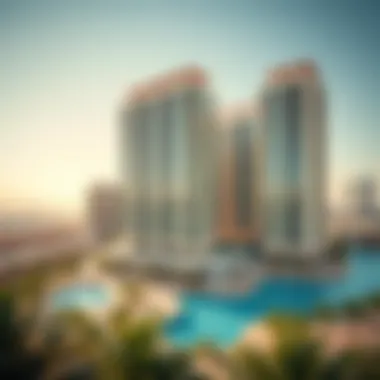

Dubai stands as a testament to the phrase, "the world is a village." Here, the art of coexistence flourishes among various cultures. The spectacular blend creates a kaleidoscope of experiences that attracts not just tourists, but also professionals seeking new opportunities.
Residents can explore Prince Charles of Monaco’s annual yacht show or indulge in the vibrant street markets showcasing Pakistani craftsmanship. This cultural variety does more than beautifying the city; it enhances the professional landscape, leading to innovative collaborations that can shake up industries.
Each cultural group contributes to the overall identity of Dubai. Traditionally celebrated holidays resonate through the city, allowing expatriates to partake in celebrations, thereby bridging gaps between communities. This growing population also demands a plethora of services that cater to various demographics, driving real estate growth and economic opportunities.
Integrating into Dubai's Society
Integration into Dubai's society requires both a willingness to adapt and a cognizance of local practices. Understanding the societal fabric can help expatriates forge meaningful connections and establish roots.
One avenue to integrate is through community activities and clubs. For example, joining a book club at the Dubai International Academic City or participating in sports leagues fosters connections with like-minded individuals. Here are some effective strategies for integration:
- Get Involved:
- Stay Informed:
- Learn the Language:
- Volunteer opportunities abound in Dubai, ranging from animal shelters to environmental initiatives.
- Attend cultural events and exhibitions to learn and appreciate the local art scene.
- Following local news outlets and joining expatriate forums help in understanding the nuances of life in Dubai. Websites like reddit.com can be valuable for real-time insights and advice.
- While English is widely spoken, learning basic Arabic phrases can show respect and willingness to connect. Simple greetings or polite expressions can endear oneself to the locals.
"Cultural integration is not merely about observation, it’s about participation and contribution to the community."
Thoroughly understanding and adapting to Dubai's cultural considerations can enhance one’s living experience and influence professional relationships. As expatriates take the time to engage with this multicultural grandeur, they lay down the groundwork for not only a prosperous life but also a fulfilling journey in this cosmopolitan jewel of the Middle East.
Government Policies and Regulations
The landscape of an international city is largely shaped by its government policies and regulations. Understanding the rules that govern aspects of real estate and investor engagement is crucial for anyone looking to navigate Dubai's vibrant marketplace. These policies can either expedite or complicate the path for investors, developers, and homeowners alike, making it imperative to have a nuanced understanding of them. In Dubai, the government has actively sought to encourage foreign investment while also ensuring that the local economy remains robust and resilient.
Real Estate Laws and Ownership Structures
Dubai's real estate laws are a confluence of modernity and tradition. Foreigners can invest in properties in designated areas, often referred to as freehold zones. These areas allow non-UAE nationals to own property outright, which is not commonplace in many countries.
However, these ownership structures come with their own sets of regulations. Here are a few key points:
- Freehold vs. Leasehold: In freehold areas like Dubai Marina and Downtown Dubai, foreigners can acquire full ownership. Leasehold options exist, allowing for a limited-time ownership (typically 99 years) in other zones.
- Registration and Fees: Every property transaction requires registration with the Dubai Land Department, along with a fee that is usually around 4% of the property value. This step is crucial as it protects the buyer's rights.
- Mortgage Regulations: Foreign investors often look to financing options. Banks in Dubai have specific criteria that need to be met for non-residents; for instance, the down payment might be higher compared to local buyers.
- Building Codes and Safety Standards: The UAE has strict building codes that ensure safety, sustainability, and aesthetic appeal. Complying with these standards is non-negotiable for developers.
Incentives for Foreign Investors
To further bolster its reputation as a global city, Dubai offers several incentives tailored to attract foreign investment, which are not only beneficial for the economy but also for investors looking for profitable opportunities. Here’s an overview:
- Tax Benefits: Dubai is known for zero property taxes and no capital gains taxes, making it an attractive option for investors. This structure helps to maximize returns on investments compared to other regions.
- Business Set-Up Framework: The government has streamlined the business formation process, enabling foreign investors to establish their businesses within weeks under favorable conditions. Special economic zones provide further advantages, including 100% foreign ownership.
- Long-Term Residency Options: Recent regulations allow property owners to qualify for long-term residency visas. A property purchase above AED 2 million grants access to a 10-year residency visa, crucial for those seeking a stable lifestyle.
- Investment Protection Laws: Dubai has instituted laws that safeguard investor interests, such as the Property Registration Law, which protects against fraudulent activities in property transactions.
"Understanding the nuances of government policies not only unlocks the potential for investment but also facilitates a smoother integration into Dubai’s thriving market."
In summary, navigating Dubai's government policies requires careful consideration, but the rewards can be worth the effort. By grasping the details of real estate laws and the incentives available, potential investors can better position themselves for success in this dynamic international city.
Infrastructure and Urban Planning
The significance of infrastructure and urban planning in Dubai cannot be overstated. As an international city, Dubai has evolved rapidly, necessitating a robust framework to support its burgeoning population and diverse activities. Good infrastructure serves as the backbone of any city, fostering not only economic growth but also cultural integration and sustainability. For investors and homeowners alike, understanding the nuances of this development can offer insights into the evolving opportunities within the city.
Transportation Networks and Connectivity
Dubai boasts an intricate web of transportation networks that seamlessly connect different parts of the city. The expansion of the Dubai Metro, for instance, has significantly enhanced the ease and efficiency of commuting. More than just a mode of transport, the Metro symbolizes Dubai's commitment to modernity and sustainability. With several lines stretching through key districts, it has made navigating the city as smooth as butter.
Besides rail, a well-coordinated bus network complements these services, ensuring no stone is left unturned in connecting major landmarks and residential areas. Taxis are also widely available, providing quick and flexible travel options. However, what's eye-catching is the ongoing work on the Hyperloop Project aiming to connect Dubai to other emirates at lightning speed. If successful, this could transform inter-emirate travel and make daily commutes a breeze.
The essence of a thriving city lies in its ability to connect people and places efficiently; Dubai is on the fast track to achieving this.
Sustainable Urban Development Initiatives
As UAE grapples with global environmental challenges, Dubai has recognized the importance of sustainable urban development. One shining example is the Dubai Sustainable City project, an entire community designed with eco-friendly attributes in mind. Homes are fitted with solar panels, and the layout promotes walkability, enabling residents to enjoy clean air and green spaces. Such initiatives not only enhance residents' quality of life but also attract eco-conscious investors keen on green investments.
Another noteworthy feature is the Smart Dubai initiative, which aims to transform the emirate into a global tech hub. This incorporates technologies like artificial intelligence and the Internet of Things (IoT) in urban planning. By optimizing resource use and managing waste effectively, these technologies enhance livability.
Investors can benefit from this trend towards sustainability, as properties in such developments often see a surge in value due to their increasing appeal.
In summary, a city’s infrastructure and urban planning not only shape its present but also lay the foundation for its future. In Dubai, both are evolving with an eye toward a sustainable tomorrow while ensuring that connection remains at the core of its urban philosophy.
Lifestyle and Amenities in Dubai
Dubai is not just a destination; it’s a lifestyle. The city’s blend of luxury, comfort, and convenience ensures that residents and visitors alike have access to a plethora of amenities that cater to diverse needs and preferences. The availability of high-end shopping venues, exquisite dining options, and vibrant entertainment avenues elevates the living experience in Dubai, making it essential to understand these aspects when exploring the city as a global hub.
Shopping, Dining, and Entertainment Options
Shopping in Dubai is akin to a treasure hunt. The massive malls like The Dubai Mall and Mall of the Emirates offer everything from high-street brands to luxury boutiques. These shopping hotspots provide immersive experiences, not just shopping, but also entertainment like indoor ski slopes, aquariums, and even VR parks.
- Iconic Malls:
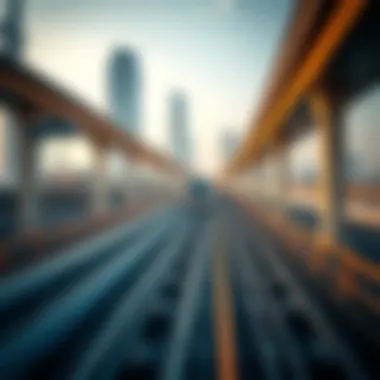

- The Dubai Mall – Home to the world’s largest shopping mall, this venue is not just about retail; it offers an unparalleled experience, including a breathtaking fountain show.
- Mall of the Emirates – Known for its indoor skiing, this mall combines shopping with extreme winter sports, which is certainly a unique twist for a desert city.
When it comes to dining, Dubai does not disappoint. You can find street food from various cultures to Michelin-starred restaurants. The culinary scene is as diverse as the population.
- Popular Dining Areas:
- Dubai Marina - Perfect for those seeking a view alongside their meal, with countless restaurants lining the waterfront.
- Al Quoz - This area has become the go-to spot for foodies looking for trendy cafes and innovative dining experiences.
Entertainment is abundant and varied, featuring everything from concerts to desert safaris. One can catch a show at Dubai Opera or experience bustling nightlife at places like White Dubai.
“Dubai is a city of dreams, where the sky isn’t the limit, it’s just the beginning.”
Healthcare and Education Facilities
Living in Dubai offers excellent access to top-notch healthcare and educational facilities, which is crucial for families and professionals looking to settle in this vibrant city. The healthcare system is a blend of public and private facilities that are both state-of-the-art and equipped with the latest technology.
- Healthcare Facilities:
- Cleveland Clinic Abu Dhabi – Known for advanced medical care, including a wide range of specialities.
- Mediclinic City Hospital – Offers a comprehensive array of medical services, tailored to meet the growing healthcare needs of the community.
Dubai's educational landscape is similarly impressive. It hosts institutions that follow various international curricula, making it easier for expatriates. Here, schools offer everything from British GCSEs to American high school diplomas.
- Noteworthy Educational Institutions:
- Dubai British School – Renowned for its high academic standards.
- GEMS Education – Operates multiple schools across the city, known for a well-rounded educational experience.
In summary, Dubai's lifestyle is characterized by a high standard of living supported by extensive amenities. The rich tapestry of shopping, dining, and entertainment, along with exceptional healthcare and education, positions the city as a truly cosmopolitan hub, appealing to investors and expatriates seeking quality in their urban environment.
For more in-depth information on Dubai, visit
Wikipedia on Dubai
Britannica on Dubai
Visit Dubai
By recognizing these vibrant lifestyle aspects, individuals can better appreciate what makes Dubai a leading international city.
Future Outlook: Dubai’s Role in Global Economics
As we gaze into the crystal ball of Dubai’s evolving economic landscape, it becomes abundantly clear that this city is not merely a passing phase in the global arena. It has cemented itself as a formidable player, orchestrating a symphony of commerce that resonates around the world. By having an international city like Dubai at the core of regional trade, investors and businesses are afforded a unique vantage point, making it essential to closely examine the nuances of this growth and its ultimate trajectory.
"Dubai, often seen as a beacon of innovation, continues to carve out its niche in the global marketplace, embodying the essence of ambition and opportunity."
Emerging Markets and Sectors
In the midst of Dubai's dynamic tapestry lies a multitude of emerging markets and sectors poised to drive future growth. The city's strategic location acts as a launch pad for various industries, ranging from technology to tourism. With visionary projects like the Dubai Expo 2020 (delayed to 2021 due to the pandemic, but still buzzing) having taken center stage, the spotlight shines on sectors such as logistics, healthcare, and renewable energy.
Another sector necessitating attention is fintech. Dubai’s embrace of digital solutions has paved the way for an influx of startups and investments, making it a frontrunner in the financial technology race. Crypto and blockchain technologies are rapidly gaining traction, circumscribing the traditional boundaries of banking and finance.
- Logistics and E-commerce: With its state-of-the-art warehousing and transport facilities, e-commerce giants like Amazon are rapidly establishing a foothold in Dubai, allowing for swift market penetration across the Middle East.
- Healthcare Innovations: Investments in healthcare not only enhance the quality of life for residents, but also position Dubai as the go-to hub for medical tourism. Specialized clinics and cutting-edge research institutions are sprouting up like mushrooms, catering to a diverse clientele.
- Green Technologies: Driven by a commitment to sustainability, Dubai is increasingly investing in green energy solutions, aligning with global environmental objectives. Initiatives aimed at building sustainable urban environments highlight the city’s forward-thinking approach.
This rich tapestry of growth sectors dovetails perfectly with Dubai's broader economic landscape, directly contributing to its standing as an international hub.
Potential Challenges Ahead
Even the most promising prospects come with their fair share of hurdles, and Dubai is no exception. Its ambitious plans and rapid growth could lead to potential risks that deserve careful consideration. The competitive nature of international markets means that Dubai must continuously innovate and adapt to other global economic trends.
One pressing challenge is the ever-evolving regulatory environment. Investors may find themselves facing a confusing landscape of rules and protocols that can change unexpectedly. This unpredictability, while part of the business terrain, can pose significant challenges for those looking to invest.
Moreover, as Dubai continues to attract talent from around the globe, the infrastructure will be stretched to keep up with the increased demand for housing, schools, and healthcare services.
- Economic Diversification: The need to diversify its economy away from oil dependency is paramount. While Dubai has already made significant leaps, the continual decline in oil prices presents risks that require agile strategic responses.
- Geopolitical Considerations: Conflicts in nearby regions can influence investment decisions and create instability, leading to potential market fluctuations.
- Social Integration: Balancing the cultural melting pot that is Dubai can be tricky as increasing expatriate populations pose challenges for social cohesion.
In summation, while Dubai has positioned itself as a leading economic powerhouse with a rich prospect for growth, it must tread carefully on its path to ensure sustainability and adaptability amidst the complexity of global challenges.
Ultimately, the future of Dubai as an international city hinges on its capacity to remain innovative and responsive, fostering a resilient economic structure that can withstand the test of time.
Ending
Dubai's journey to establishing itself as a leading international city is nothing short of remarkable. The facets of its growth, from a simple fishing village to a bustling, modern metropolis, underline significant lessons for cities around the world. It's crucial to reflect on the points highlighted throughout this article, especially the multifaceted layers that make Dubai a unique global entity.
Summarizing Dubai's Transformative Journey
Dubai's evolution is a testament to its visionary leadership and economic strategy. Noteworthy phases in this transformation involve strategic urban planning, substantial investments in infrastructure, and an unparalleled commitment to fostering a multicultural society. This completely reshaped the city’s identity and made it attractive to a range of international investors and expatriates. Here are key milestones:
- Economic Diversification: Reducing reliance on oil revenue by promoting tourism, aviation, and financial services.
- Sustainable Development: Implementing eco-friendly urban planning initiatives to promote environmental sustainability.
- Cultural Hub: Establishing art, fashion, and culinary districts that cater to global tastes,
Fundamentally, Dubai has not merely adapted to the global demands but has often preempted trends, positioning itself ahead of the curve. The successful hosting of international events like Expo 2020 has only solidified its status. As such, studying the city’s rise provides invaluable insights for stakeholders seeking to understand the roadmap to success in urban development and international business.
The Path Forward for Dubai as an International City
Looking ahead, Dubai stands at a crossroads, poised to harness new technologies and global trends while navigating potential challenges. The path forward entails leveraging its existing advantages while addressing pressing issues such as:
- Real Estate Volatility: Ensuring stability in property values amidst rapid development and fluctuating market demands.
- Economic Resilience: Adapting to global economic shifts while maintaining a competitive edge.
- Cultural Integration: Balancing the influx of expatriates with local traditions and social norms.
Investors, developers, and city planners must keep their fingers on the pulse of these dynamics. The key will be to maintain an adaptable and responsive approach to ensure that Dubai continues to thrive as a beacon of innovation in the international arena. By focusing on sustainability, inclusiveness, and economic diversification, Dubai can not only uphold its current stature but also emerge as a model for future urban developments worldwide.
"Progress is impossible without change, and those who cannot change their minds cannot change anything."
For more detailed exploration on Dubai's transformative journey and future strategies, visit Wikipedia or check out different insights on Britannica.

